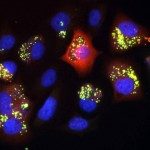Link to Pubmed [PMID] – 10952411
Hybridoma 2000 Jun;19(3):229-39
In this work, we have constructed two functional mouse/human chimeric antibodies (IgMkappa and IgG1kappa isotypes) by inserting genomic DNA fragments encoding VH and Vkappa variable regions of the murine monoclonal antibody IgMK-83D4 into mammalian expression vectors containing human mu, gamma1, and kappa constant exons, and by transfecting them into the nonsecreting mouse myeloma X-63 cell line. In previous works, we have demonstrated that 83D4 murine mAb reacts with Tn determinant (GalNAcalpha-O-Ser/Thr) expressed in 90% of breast, ovary, and colon carcinomas. Both expressed chimeric antibodies were purified from the transfected cell line supernatant by affinity chromatography, and their reactivities against Tn antigen were confirmed by ELISA on asialo ovine submaxilar mucin and immunofluorescence studies on MCF-7 breast carcinoma cell line. We have demonstrated by gel filtration chromatography, that the principal secreted forms were monomers for IgG1kappa and pentamers for IgMkappa. The binding affinities of these chimeric antibodies against synthetic Tn glycopeptides, were evaluated by surface plasmon resonance showing an affinity constant similar to that of 83D4 native antibody for IgMkappa and a lower affinity constant for IgG1kappa chimeric antibody. On the other hand, the replacement of mouse C regions with human C regions confers both chimeric antibodies the ability to activate human complement. These mouse/human chimeric antibodies should be much less immunogenic and could play an important role in the lysis of tumor cell expressing Tn-antigen. Therefore, these anti-Tn chimeric antibodies could be considered as potential tools for human in vivo studies.

